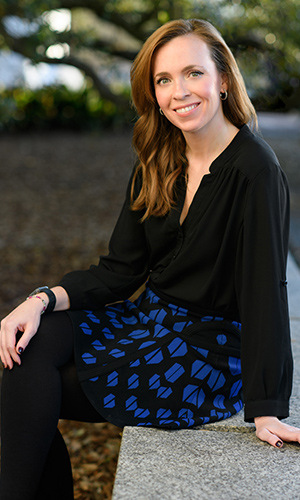
Kathleen “Katie” Searles joins the faculty of USC’s Department of Political Science this fall, bringing a wealth of expertise in political communication. She comes to the University of South Carolina as the department’s Olin D. Johnston Chair in Political Science after having previously served in faculty roles at Augusta University in Georgia and Louisiana State University in Baton Rouge, LA.
Searles’ interests include news media, information communication technology and political psychology. She has co-authored two books with leading academic presses and has been awarded grant funding from such agencies as the National Science Foundation for her research. She is also leading efforts to improve various aspects of media representation, including working with journalists to cover electoral politics.
In this Q&A, Searles shares about her passion for political science and why she’s been a longtime Gamecock fan.
What brought you to USC? Tell us about your journey so far.
I have been a Gamecock fan since my very first job out of graduate school, where I worked nearby in Augusta, Georgia. We quickly found that in Augusta you either had UGA or USC fans, and we were lucky enough to have the latter.
This was all long before kids, but I remember thinking what a great place it would be to work and raise a family. I never thought that eventually I would have the opportunity, and for that I am forever grateful.
What first drew you to your main area of expertise? What do you love about it?
I always argued with my family about politics from an early age – which made me very popular at family reunions. I knew I had a passion for the subject matter but luckily realized quickly that it was studying it – the research – not the practice of it, that I truly loved.
I credit my undergraduate mentors for that: they made sure that research was a major component of my training. Because of them, I knew that the research track was an option for me. I think about this all the time when I mentor undergraduate and graduate students, and I very much take a teacher-scholar approach in my own pedagogy as a result.
How would you describe your research to someone who hasn't studied this field before? What do you hope the impact of your research will be?
I am trained in American Politics broadly and more specifically in political psychology. My research area can best be described as “political communication.” I am often focused on the study of information from production to effects – but really, I think of myself as doing research at the intersection. In short, this means I draw on research from a range of disciplines and subfields to address the most pressing questions facing democracy.
I seek to do problem-driven work – work that contributes to knowledge but also yields practical insights for industry and the public. I think now more than ever, we are called upon to do work that crosses disciplinary boundaries in this way, so that we can most effectively address democratic challenges.
Do you have anything coming up at USC that you are particularly excited about?
I just launched an exciting project that I co-founded with my colleague and friend Rebekah Tromble (George Washington University) called the Researcher Support Consortium (RSC). The RSC is a resource that helps address online abuse directed at academic researchers. It has information for funders, institutions and researchers who are experiencing or want to support those who experience intimidation because of the important work they do.
This project is the product of years of grant-funded research with members of expert communities who have been targeted. It is a great example of the kind of work that drives me – rigorous, research-driven and in support of bigger democratic questions.
Will USC students have opportunities to get involved with your research?
Involving students in my research is vital, especially as I believe I would not be here if someone had not done the same for me, and I’m excited to work with the next generation. When students get involved with my research, they should expect to draw from multiple disciplines – political science, psychology, communication – and multiple approaches to collecting data – surveys, experiments (in the lab and in the field), interviews, and case studies. I love methodological puzzles and asking questions with big implications, and often that requires an interdisciplinary, multi-method approach, something I think is useful training for students regardless of what they want to pursue post-graduation. I also like doing work that has practical implications – whether for the public or industry, and I often work with community partners to ensure the research supports the communities I study. This means that students that work with me do all sorts of things: that may be assisting me implement experimental protocols in the lab, helping me to translate research findings into an infographic, or analyzing news media content. If a student is interested in adding research experience to their portfolio, and they have the time, capacity, and motivation, they can reach out to me to inquire about potential opportunities!
Learn more about Kathleen Searles.